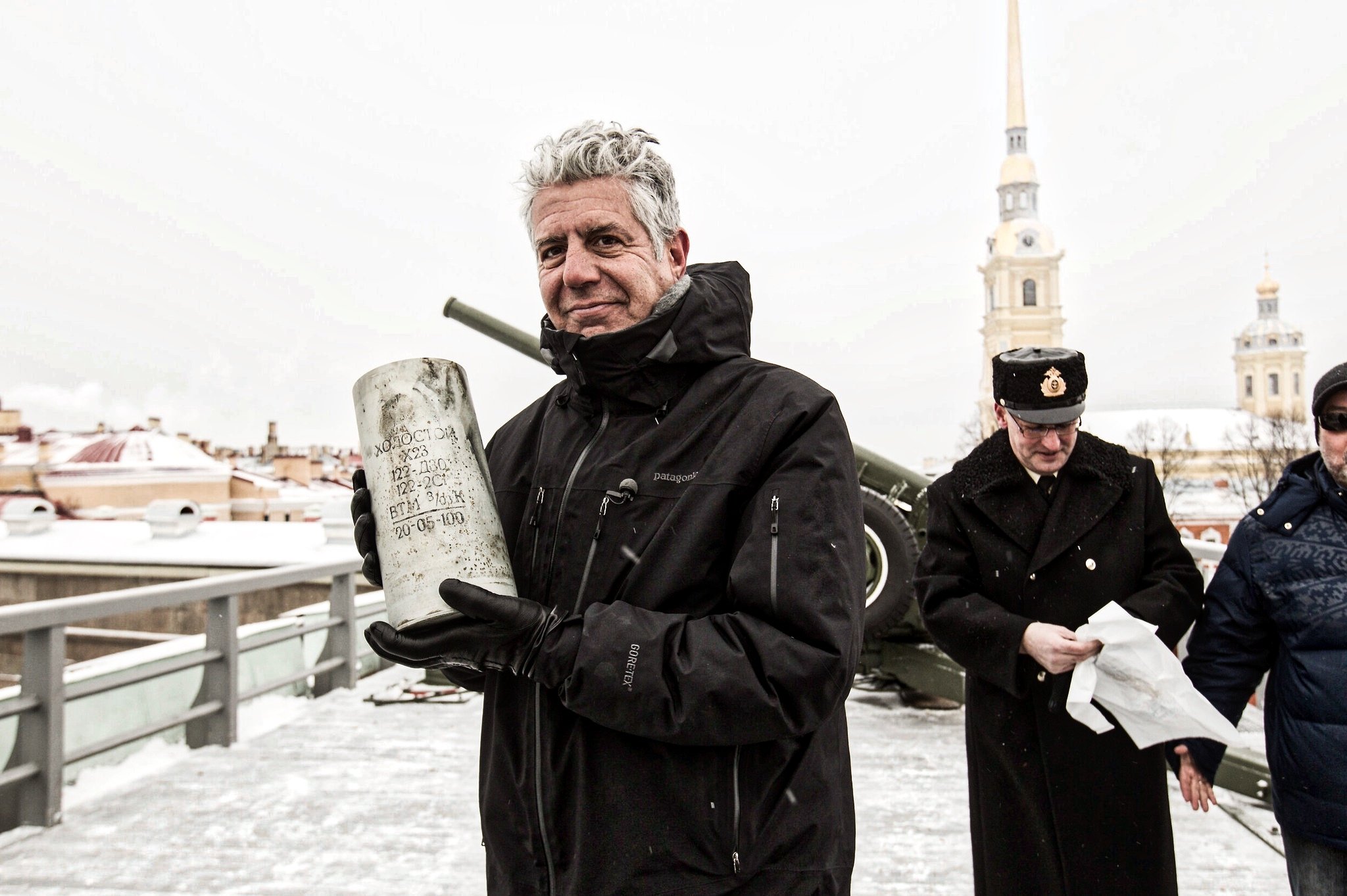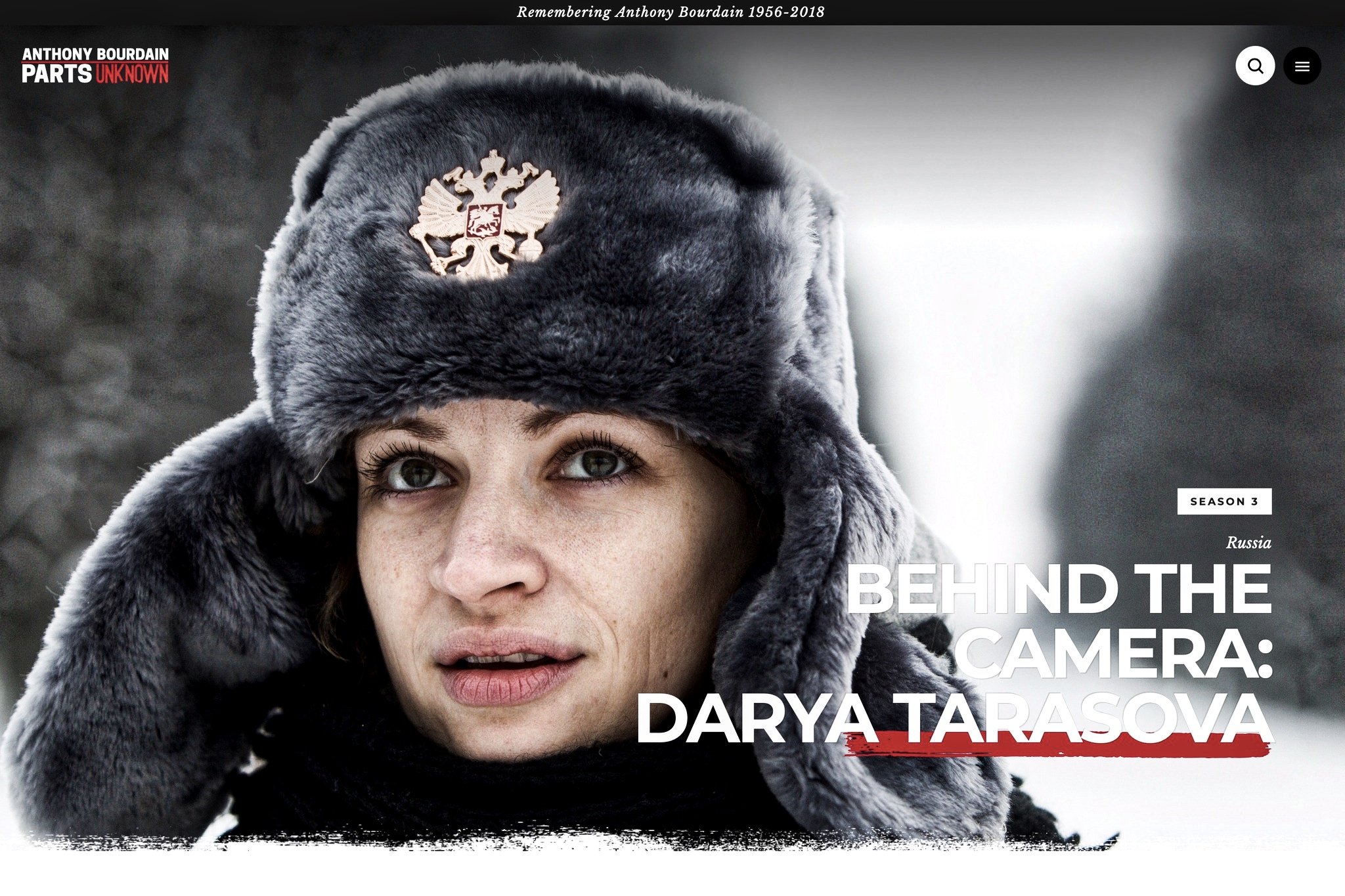“With the [sic] possible Russian invasion of Ukraine all over the news,” locations photographer David Scott Holloway posted on Reddit two years ago, “I’ve found myself thinking a lot about when we travelled there for Parts Unknown.” Today, ten years after that episode first aired, Anthony Bourdain’s ‘Russia’ is as trenchant — and poignant — as if it had aired yesterday.
Where to begin?
As with so many things to do with Anthony Bourdain’s restless, eyes-open wanderings and soulful ruminations in his Parts Unknown verite docuseries for CNN, you can’t go too far wrong by beginning with Bourdain himself. In truth, Bourdain sowed the creative, philosophical and geographical ground for Russia years earlier, in 2002, during his nascent A Cook’s Tour program for the Food Network. That is when Bourdain first broke bread — or rather downed a vodka or two (or three or four) — with his soon-to-be friend, sidekick and semi-frequent travel companion Iazamir “Zamir” Gotta.
As an older, more self-reflective Bill and Ted of the travel-TV set, Bourdain and the Moscow-born Gotta, just a year apart in age at the time (Bourdain was born in 1956, Zamir in 1957), were philosophical peas in a pod, so to speak. Where Bourdain was caustic and observant and not a little cynical — ideal attributes for a life as a chef in a restaurant kitchen — Gotta was, and remains, somewhat of an innocent abroad, cheerful, ebullient and soulful by turns.
It was their shared sense of humour, one acerbic and always looking to burst the proverbial balloon with a sharp, well-timed verbal barb and the other making it up as he goes, zany and full of life, coupled with their shared humanity and deep-rooted respect for the hopes and dreams of decent, ordinary, everyday working people — that made Bourdain and Gotta such an agreeable pair in Parts Unknown.
Zamir first appeared in a pair of A Cook’s Tour episodes, aptly titled The Cook Who Came in from the Cold and So Much Vodka, So Little Time, but it was in No Reservations, years later on Travel Channel, that they truly made their mark with the TV-viewing audience, with seven episodes over an eight-year period, in visits to Uzbekistan, Russia (specifically, St. Petersburg, aka Petrograd, or to Soviet enthusiasts, Leningrad), Romania — arguably one of the zaniest, most outrageous hours of TV that Bourdain and his long-suffering cameraman/producer/director Tom Vitale ever made together — Ukraine (yes, that Ukraine) and, interestingly, the U.S. heartland: the Rust Belt, Kansas City and Brooklyn, NY, unofficially the heart of Bourdain’s native NYC.
Russia, for Parts Unknown, would prove to be fortuitously timed, happening as it did just weeks before the Sochi Olympics and not long before Russia’s invasion of Crimea, Vladimir Putin’s bid to rewrite the history of the Crimean War — 1853-1856, updated for the 21st century.
Russia opens in a field of snow amid a stand of birch trees — “Beautiful, right?” Zamir says off-camera, “We can already indulge ourselves into something special. Such a beautiful day! … Ah, what a place.”
He’s being both literal and ironic, of course, irony being one of the hallmarks of Russian literature — and as a writer myself, I can honestly say that Russian literature is just about at the very top of the field, up there with Aeschylus, Sophocles, Euripides and Shakespeare.
Bourdain famously hated the cold, and the making of Russia coincided with one of the most bitter winters in Russian memory at the time. Bourdain famously said that an ill-advised shoot in Lapland in mid-winter just about killed him; it’s not hard to imagine that, years later, sunning himself in Goldeneye, Ian Fleming’s retreat in Jamaica, Bourdain took one long look at the beach and thought to himself, I could get used to this.
It isn’t long before Bourdain tells viewers what he really thinks of Russia’s fearless leader — still is today, ten years later — “All hail the Maximum Leader. Now, let’s dance!” — but it doesn’t bear repeating here. Bourdain had an inimitable way of describing his irritation at certain people in the public eye, and he is unsparing in his assessment of Maximum Leader. It’s the kind of descriptive way with words that made Bourdain famous, and really should be seen for oneself (Parts Unknown episodes are available for streaming on the (HBO) MAX streaming site, co-owned by CNN owners Warner Bros. Discovery, and are available for purchase on Apple’s Apple TV (formerly iTunes) site).
“It's February 2014, and the Sochi Olympics are just coming up when I arrive in Moscow,” Bourdain says in the opening. “It's a different Moscow every time I come here. The '80s style, go-go capitalist conspicuous consumption see-who-can-spend-the-most-money disco-techno thing that I encountered when I first came here back in 2001 — it's still going strong.
“In fact, these days, Moscow has one of the highest concentrations of billionaires in the world. But as never before, it's imperial Russia now, a one-man rule.
All power emanates, every decision must consider, this guy.”
Russia is full of characters with murky pasts and shadowy connections, Bourdain continues. “But one of them I've called a friend for more than a decade.”
“Tony, wow,” Gotta replies, humbled and awed. And genuine.
And that’s what really works throughout Parts Unknown, not just in Russia but in all the episodes. This is genuine.
“I guess I’m switching to vodka, Zamir.” Bourdain tells him. Switching? When travelling in Russia in the dead of winter, when was he ever off vodka?
“Listen, as a born Muscovite, I'm trying to be a good patron,” Gotta tells him. “So I really want you to tell me, frankly, a week from now, ‘Zamir, now I understand why stereotypes sometimes send a bad message about Russia.’
Bourdain: “I have an open mind. Everything's great. Russians have everything they want.”
Zamir: “Listen, why don't we just taste the vodka.”
Discussions of Mikhail Khodorkovsky, Alexander Litvinenko, Viktor Yushchenko and a sit-down dinner over pelmeni, a modern riff on borscht, at Moscow’s Yornik restaurant (now closed), with former deputy prime minister (under Boris Yeltsin) Boris Nemstov, a prominent dissident and vocal critic of the Maximum Leader, who would not be long of this world after that dinner with Bourdain. A coincidence? Probably just that — Maximum Leader’s issues with Nemstov ran much deeper than one chance meeting for the TV cameras for US TV. CNN is not a thing in Russia, after all — there, it’s all about Rossiya 1, Channel One, NTV and Russia Today.
A quick scan of Reddit shows that Russia remains one of the five favourite programs for many of Bourdain’s followers
One of the more remarkable things about Bourdain’s body of work in Parts Unknown is just how many episodes count as “five favourite episodes” for someone. There truly was something special in every hour Bourdain, Vitale and Zero Point Zero Production made for CNN, something to appeal to at someone somewhere on a deep, fundamental level. And not just in the US, either. Parts Unknown’s appeal was worldwide.
How to end?
Not with Bourdain this time, though Bourdain does end Russia on a particularly powerful and trenchant note — how could he not?
On the Parts Unknown companion website ExplorePartsUnknown.com, taken offline for several weeks until just the past few days, possibly because it was hacked — that’s what the AI-generated browser blockers said at the time, anyway — there’s a telling, warm reminiscence of behind-the-scenes filming with Russian photographer and film-maker Darya Tarasova. (Also worth a look is the work of veteran set- and locations photographer David Scott Holloway, who has shared links to his Bourdain work, some featured here, on Reddit, and through his website at https://davidscottholloway.com).
The Q&A, conducted and written by Nathan Thornburgh (https://explorepartsunknown.com/russia/behind-the-camera-darya-tarasova/), sheds light on some charming moments that explain, as well as anything in the actual episode, Bourdain's unique relationship with Zamir.
“There was a funny moment in Moscow,” Tarasova recalled. “Tony and Zamir had a kind of skiing competition, because we were filming the episode ahead of the Olympic Games in Sochi. They decided to have fun with the Olympic theme. Anthony was wearing a big jacket that had ‘USA’ on it, and Zamir had his own jacket that said ‘Russia.’ So we had Russia versus the USA. Zamir kept shouting, ‘I will break you!’ He was there to win.
“Zamir knows how to ski, but he wasn’t very proficient when he was trying to go down this hill. And Tony wasn’t in great shape either, but he won the race.
“Zamir just fell down in the middle of the hill and then rolled to Tony’s feet.”
Then there’s the moment with the 122-mm D-30 Howitzer cannon, fired to commemorate the occasion of the October 1917 revolution that ushered in decades of rule — or misrule, depending on your point of view — of Soviet Communism.
Bourdain is invited to load a shell into the Howitzer, and — stand back, everybody… — Bang! It goes off.
Bourdain is happily handed the empty shell, all 21kg of it, once it’s ejected from the Howitzer.
“Enemy is destructed!” Zamir tells him. “Congratulations, you are the hero of Russia now.”
Bourdain: “Sweet.”
Zamir: “You can't take it on the plane, though. They won't understand.”
Bourdain: ”Not even carry on?”








